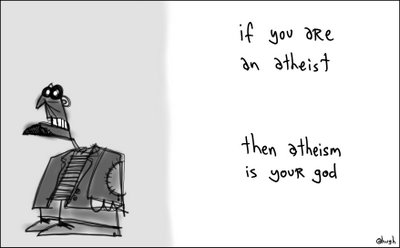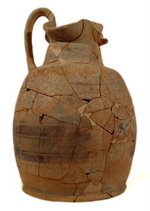19 October 2006
16 October 2006
Healing by Faith
 I have reason to go and pray for a dear friend, who recently survived one cancer scare, only to have another rear up its ugly head. Like many Christians I know, I believe that people can be healed through prayer - but I also find it a challenge to develop the faith to wholeheartedly trust in prayer. It is always useful in these situations to consider what Jesus did in these situations - because even he did not always find it possible to heal everyone.
I have reason to go and pray for a dear friend, who recently survived one cancer scare, only to have another rear up its ugly head. Like many Christians I know, I believe that people can be healed through prayer - but I also find it a challenge to develop the faith to wholeheartedly trust in prayer. It is always useful in these situations to consider what Jesus did in these situations - because even he did not always find it possible to heal everyone.
When it comes to the miracles of Jesus, I find Mark 6:1-13 to be one of the most amazing pieces of scripture. It is the only place where Jesus says he could not do any miracles - the reason being the lack of faith of his family, neighbours and hometown. Cynics point to this as evidence that his miracles relied upon slight of hand, and willing self-delusion by those 'healed'. But read this entire section:
Jesus left there and went to his hometown, accompanied by his disciples. When the Sabbath came, he began to teach in the synagogue, and many who heard him were amazed.Straight after being rejected himself, Jesus sends out the disciples to do what he could not do in his hometown. Talk about asking them to take a leap of faith!
“Where did this man get these things?” they asked. “What's this wisdom that has been given him, that he even does miracles! Isn't this the carpenter? Isn't this Mary's son and the brother of James, Joseph, Judas and Simon? Aren't his sisters here with us?” And they took offense at him.
Jesus said to them, “Only in his hometown, among his relatives and in his own house is a prophet without honor.” He could not do any miracles there, except lay his hands on a few sick people and heal them. And he was amazed at their lack of faith.
Then Jesus went around teaching from village to village. Calling the Twelve to him, he sent them out two by two and gave them authority over evil spirits.
These were his instructions: “Take nothing for the journey except a staff—no bread, no bag, no money in your belts. Wear sandals but not an extra tunic. Whenever you enter a house, stay there until you leave that town. And if any place will not welcome you or listen to you, shake the dust off your feet when you leave, as a testimony against them.”
They went out and preached that people should repent. They drove out many demons and anointed many sick people with oil and healed them.
Until we get to heaven, we can only speculate on Jesus' reasons for doing this. Perhaps he wanted to give people the chance to be healed by an unfamiliar person, like his disciples. Or perhaps this unique failure made it easier for the disciples to trust in God, knowing that it was the faith of those they preached to that would make the difference?
Later in Acts 14:8-10 we see Paul healing a man because of his faith:
In Lystra there sat a man crippled in his feet, who was lame from birth and had never walked. He listened to Paul as he was speaking. Paul looked directly at him, saw that he had faith to be healed and called out, “Stand up on your feet!” At that, the man jumped up and began to walk.So it is quite clear that faith is a key difference between receiving healing or not. Unfortunately, some people blame others of a lack of faith when they are not healed by prayer. At its most militant this can lead to people being accused of being 'backsliders' or 'unsaved'. Whilst this is possible, I think we should examine our reaction to others' lack of faith. Rather than condemn, we should encourage, rather than chastise, we should console.
For a good encouraging verse about this issue, we need look no further than James 5:13-18:
Is any one of you in trouble? He should pray. Is anyone happy? Let him sing songs of praise. Is any one of you sick? He should call the elders of the church to pray over him and anoint him with oil in the name of the Lord. And the prayer offered in faith will make the sick person well; the Lord will raise him up. If he has sinned, he will be forgiven. Therefore confess your sins to each other and pray for each other so that you may be healed. The prayer of a righteous man is powerful and effective.Clearly if Elijah could pray and have God create or break a drought, we can also pray and expect great things. In other words, it is the God we serve who does the miracles, not us, and we can have faith knowing that normal people before us have prayed and received miracles like the ones we need.
Elijah was a man just like us. He prayed earnestly that it would not rain, and it did not rain on the land for three and a half years. Again he prayed, and the heavens gave rain, and the earth produced its crops.
by
Falkayn
at
10/16/2006 10:57:00 pm
0
comments
![]()
Tags: miracles
10 October 2006
Flat Earth Myth
Whilst reading the comments on one of Andrew Bolt's posts and came across an interesting link to an article entitled Myth of the Flat Earth by historian Jeffrey Russell.
Russell points out that claims that the Church Fathers believed or promoted the idea of a flat earth, particularly in opposition to Christopher Columbus, are absurd. He claims that most Christians since the 3rd century believed in a spherical Earth. The flat earth myth began in the 1830s in Paris. So why did this myth catch on?
“The answer is that the falsehood about the spherical earth became a colorful and unforgettable part of a larger falsehood: the falsehood of the eternal war between science (good) and religion (bad) throughout Western history. This vast web of falsehood was invented and propagated by the influential historian John Draper (1811-1882) and many prestigious followers, such as Andrew Dickson White (1832-1918), the president of Cornell University, who made sure that the false account was perpetrated in texts, encyclopedias, and even allegedly serious scholarship, down to the present day. A lively current version of the lie can be found in Daniel Boorstin's The Discoverers, found in any bookshop or library.”Given Pope Benedict's recent speech about the place for theology in the sciences, the false view that science and religion must be opposed is a common one. For my own part, when I found my faith in Christ, I did not lose my interest in science - but I came to see that science (as I understood it) did not trump faith, but supports and is informed by it.
[UPDATE: Interestingly Daniel Tammet comments on how a recent interview with Richard Dawkins showed the same sort of erroneous either/or thinking about science and religion.]
by
Falkayn
at
10/10/2006 09:21:00 pm
0
comments
![]()
25 September 2006
Faith, Reason and the University
Pope Benedict's controversial speech to his old university now has an official transcript, translated into English. It makes for an interesting read if you like debating theology and what shape Christianity should have in the 21st century. The controversial quotation is less interesting than it first appeared when you can see the context of the remarks:
“It is not my intention to discuss this question in the present lecture; here I would like to discuss only one point - itself rather marginal to the dialogue as a whole - which, in the context of the issue of "faith and reason", I found interesting and which can serve as the starting-point for my reflections on this issue.Benedict's conclusion is an interesting one, and I think makes a very good point. He teases out a point of view that I had not actually understood before - which is that the setting of boundaries on the definition of "science" is a philosophical issue grounded in Greek philosophical concepts. It will be interesting to see if controversial quantum foam ideas of process physics will affect this debate (in layman's terms - they replace the platonic ideal with an ongoing process). Here is Benedict's conclusion in his own words:
In the seventh conversation (διάλεξις - controversy) edited by Professor Khoury, the emperor touches on the theme of the holy war. The emperor must have known that surah 2, 256 reads: "There is no compulsion in religion". According to the experts, this is one of the suras of the early period, when Mohammed was still powerless and under threat. But naturally the emperor also knew the instructions, developed later and recorded in the Qur'an, concerning holy war. Without descending to details, such as the difference in treatment accorded to those who have the "Book" and the "infidels", he addresses his interlocutor with a startling brusqueness, a brusqueness which leaves us astounded, on the central question about the relationship between religion and violence in general, saying: "Show me just what Mohammed brought that was new, and there you will find things only evil and inhuman, such as his command to spread by the sword the faith he preached". The emperor, after having expressed himself so forcefully, goes on to explain in detail the reasons why spreading the faith through violence is something unreasonable. Violence is incompatible with the nature of God and the nature of the soul. "God", he says, "is not pleased by blood - and not acting reasonably (σὺν λόγω) is contrary to God's nature. Faith is born of the soul, not the body. Whoever would lead someone to faith needs the ability to speak well and to reason properly, without violence and threats... To convince a reasonable soul, one does not need a strong arm, or weapons of any kind, or any other means of threatening a person with death...".
The decisive statement in this argument against violent conversion is this: not to act in accordance with reason is contrary to God's nature. The editor, Theodore Khoury, observes: For the emperor, as a Byzantine shaped by Greek philosophy, this statement is self-evident. But for Muslim teaching, God is absolutely transcendent. His will is not bound up with any of our categories, even that of rationality. Here Khoury quotes a work of the noted French Islamist R. Arnaldez, who points out that Ibn Hazm went so far as to state that God is not bound even by his own word, and that nothing would oblige him to reveal the truth to us. Were it God's will, we would even have to practise idolatry.
At this point, as far as understanding of God and thus the concrete practice of religion is concerned, we are faced with an unavoidable dilemma. Is the conviction that acting unreasonably contradicts God's nature merely a Greek idea, or is it always and intrinsically true?”
“And so I come to my conclusion. This attempt, painted with broad strokes, at a critique of modern reason from within has nothing to do with putting the clock back to the time before the Enlightenment and rejecting the insights of the modern age. The positive aspects of modernity are to be acknowledged unreservedly: we are all grateful for the marvellous possibilities that it has opened up for mankind and for the progress in humanity that has been granted to us. The scientific ethos, moreover, is - as you yourself mentioned, Magnificent Rector - the will to be obedient to the truth, and, as such, it embodies an attitude which belongs to the essential decisions of the Christian spirit. The intention here is not one of retrenchment or negative criticism, but of broadening our concept of reason and its application. While we rejoice in the new possibilities open to humanity, we also see the dangers arising from these possibilities and we must ask ourselves how we can overcome them. We will succeed in doing so only if reason and faith come together in a new way, if we overcome the self-imposed limitation of reason to the empirically verifiable, and if we once more disclose its vast horizons. In this sense theology rightly belongs in the university and within the wide-ranging dialogue of sciences, not merely as a historical discipline and one of the human sciences, but precisely as theology, as inquiry into the rationality of faith.”
by
Falkayn
at
9/25/2006 12:23:00 pm
0
comments
![]()
22 September 2006
Free Christian stock photos
I came across this interesting collection of Christian stock photos the other day, and thought I'd share.
by
Falkayn
at
9/22/2006 09:25:00 pm
0
comments
![]()
Tags: christian, free, photography, stock
19 September 2006
Words fail me ... but the VIC govt failed this little girl
In a shocking case of child neglect we can see that non-government care workers did more for this baby girl, than Victoria's Department of Human Services.
“A baby suffered serious electrical burns, witnessed repeated acts of domestic violence and lived in horrific conditions for 22 months before Victorian welfare authorities finally took her away from her drug-addicted mother.The mother is Aboriginal. I wonder whether Andrew Bolt is right about political correctness causing government-run departments to act more slowly than they should because of the desire to avoid the appearance of being heartless jackbooted racists - rather than just being heartless ribbon-wearing cowards. As Andrew says:
The state's Department of Human Services was first notified of concerns for the girl in March 2001, when the child was three months old.
Despite the mother's first child being removed from her care in 1999, the second child was not removed by the department until January 2003.
The full horror of the girl's first two years of life have been detailed in a judgment handed down by the Victorian Civil and Administrative Tribunal.”
“Is it because she was Aboriginal? Is it because, as I’ve warned so often, that we leave Aboriginal children in grave danger that we would not tolerate for children of any other race because we are so terrified of the “stolen generations” myth?”Personally, I think the mother's racial background had less to do with the problem than her family history.
“When the mother was three, her older sister had been murdered. She was placed in foster care but suffered repeated sexual abuse there.I think the guilt felt for society's failure to protect her as a child, led the case workers to try and be lenient with her own failings as a parent - thus perpetuating the damage from one generation to another. We need more grace-based intervention to save these kids before they have their own children and pass on the horror, we need a robust idea of love as something that involves discipline, not some wishy-washy acceptance that it's everyone else's fault.
She lived on the street from the age of 14 and had convictions for theft and robbery from the age of 15. She also took heroin.”
Grace is a free gift of love, not license to do whatever you want. If you want to learn about grace, go study Christianity, have a robust conversation with your local priest, pastor or minister - or get Christian non-government organisations involved in caring for people - like the ones that made a difference here.
UPDATE: Added link to Andrew's post.
by
Falkayn
at
9/19/2006 12:47:00 pm
0
comments
![]()
Tags: children, government
09 September 2006
Media not interested in real miracle healings?
The Herald Sun's Bryan Patterson makes an interesting admission on his Faithworks blog:
“The Christian press sometimes follows up miracle claims with doctors reports. Years ago, I worked on a mainstream newspaper that did just that after a healing service and in most cases the doctors said they could find no rational explaination for pyhsical healings.I know of several people who have experienced genuine, document, miraculous healings - yet I've never seen the mainstream press do anything but try to deny them. Individuals in the media may disagree, Michael Willesee recently spent his own money to create the documentary Signs of God to try to prove the evidence of stigmata and healings. However, he did that after he largely 'retired' from the business, and financed it himself.
The mainstream media is sadly not so keen these days to investigate religiou miracle claims, especially when they involve Christians. I wish they were but it just ain’t so. And yet they probably occur at gatherings every day.”
 When Michael Willesee was interviewed on Andrew Denton's Enough Rope he was asked if proving miracles would really help people believe:
When Michael Willesee was interviewed on Andrew Denton's Enough Rope he was asked if proving miracles would really help people believe:“ANDREW DENTON: So you believe that by a logically and scientifically-based proof of the miracles of God, this will regenerate faith?That is a great quote, and very much my attitude as well. However, miracle healings are not ever a certainty. I and others that I know have gone to a healing service, only to find ourselves challenged in our faith and without a clear answer from God as to why we've not been healed. My current feeling about this is that God grants miracles like that as 'signs and wonders' to set the unsaved free and bring people to Him. Having become a Christian, there is less need for someone else to heal you - after all Peter points out that we have 'everything we need':
MIKE WILLESEE: With some people. I don't think for one moment that the world's going to turn on its axis and say, "Okay, now there's a God because Mick told us." Some may be converted, some will at least open their hearts to the possibility that there is a God and that he's a loving God. He's a God of love. If I get that message through to a limited number of people, then I'll have done my job.”
2 Peter 1:3James also says something similar, but is even more specific about healing:
His divine power has given us everything we need for life and godliness through our knowledge of him who called us by his own glory and goodness.
James 5:16So we can expect less public miracles and more private ones, answers to our own prayers - perhaps before others hear of it. Nevertheless, Christian's still get sick and die. Perhaps the ultimate answer to that is 'so what?' As a Christian dying should never be what we fear, as it ushers us into the next world - God's promised second creation, or heaven, or whatever you want to call it (the eternal city?). Eternal life is a given, it is thr address that we should all be uncertain about.
Therefore confess your sins to each other and pray for each other so that you may be healed. The prayer of a righteous man is powerful and effective.
For more evidence that public healings and miracles were intended to help people have faith in God, there are several verses:
Romans 15:18-19However you feel about miracles and healings you need to realise that the last thing we need in this world is a form of godliness, but not a real demonstration of it:
I will not venture to speak of anything except what Christ has accomplished through me in leading the Gentiles to obey God by what I have said and done — by the power of signs and miracles, through the power of the Spirit. So from Jerusalem all the way around to Illyricum, I have fully proclaimed the gospel of Christ.
1 Corinthians 2:4-5
My message and my preaching were not with wise and persuasive words, but with a demonstration of the Spirit's power, so that your faith might not rest on men's wisdom, but on God's power.
1 Corinthians 4:18-19
Some of you have become arrogant, as if I were not coming to you. But I will come to you very soon, if the Lord is willing, and then I will find out not only how these arrogant people are talking, but what power they have. For the kingdom of God is not a matter of talk but of power.
1 Thessalonians 1:4-10
For we know, brothers loved by God, that he has chosen you, because our gospel came to you not simply with words, but also with power, with the Holy Spirit and with deep conviction. You know how we lived among you for your sake. You became imitators of us and of the Lord; in spite of severe suffering, you welcomed the message with the joy given by the Holy Spirit. nd so you became a model to all the believers in Macedonia and Achaia. The Lord's message rang out from you not only in Macedonia and Achaia—your faith in God has become known everywhere. Therefore we do not need to say anything about it, or they themselves report what kind of reception you gave us. They tell how you turned to God from idols to serve the living and true God, and to wait for his Son from heaven, whom he raised from the dead—Jesus, who rescues us from the coming wrath.
2 Timothy 3:1-5On the other hand, not every 'miracle' is one, and some things that are altogether natural, such as childbirth, should rightly be regarded as miracles, despite not meeting the definition of one.
But mark this: There will be terrible times in the last days. People will be lovers of themselves, lovers of money, boastful, proud, abusive, disobedient to their parents, ungrateful, unholy, without love, unforgiving, slanderous, without self-control, brutal, not lovers of the good, treacherous, rash, conceited, lovers of pleasure rather than lovers of God — having a form of godliness but denying its power. Have nothing to do with them.
by
Falkayn
at
9/09/2006 11:05:00 pm
0
comments
![]()
Tags: christian, Faithworks, Michael Willesee, miracles. media




